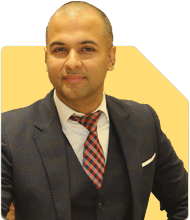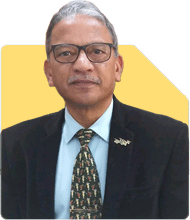Harsh Bharwani | Answer |Ask -Follow
Entrepreneurship Expert - Answered on Oct 19, 2023
As CEO and managing director, he leads the international business and employability initiatives at the computer networking institute, Jetking Infotrain Limited.
After graduating from Delhi University, Bharwani joined the family business in 2010 and set up operations in the US and Vietnam.
He has trained over three lakh students in employability, confidence and key life skills.... more

I am Having the experience of 20 + years in purchase /procurement but not getting good opportunities.
Network: Leverage your professional network to find job opportunities. Connect with former colleagues, attend industry events, and use professional networking platforms like LinkedIn to stay in touch with peers and industry professionals.
Online Job Boards: Explore job search websites and platforms that specialize in procurement and purchasing roles. Websites like LinkedIn, Indeed, Glassdoor, and specific industry job boards can be valuable resources.
Recruitment Agencies: Consider working with recruitment agencies or headhunters who specialize in procurement and supply chain positions. They can help you find relevant job openings and provide valuable insights into the job market.
Skill Development: Stay updated with the latest trends and technologies in procurement. Continuous learning and skill development can make you more attractive to potential employers. Consider taking courses or certifications in areas relevant to your field.
Targeted Applications: Focus your efforts on job openings that closely match your skills and experience. Tailor your application to highlight how your background aligns with the specific requirements of the position.
Professional Associations: Join relevant professional associations in procurement and supply chain management. These organizations often provide access to job listings and networking opportunities.
Interview Preparation: Practice your interview skills to make a strong impression during interviews. Be prepared to discuss your experience, accomplishments, and how you can contribute to the success of the company.
Consider Contract or Freelance Work: Sometimes, interim contract or freelance opportunities can lead to full-time positions. Be open to short-term roles if they align with your career goals.
Stay Positive and Persistent: Job searching can be challenging, and rejection is a part of the process. Stay positive, maintain your confidence, and keep applying to positions that interest you.
It's important to remember that finding the right opportunity can take time, especially if you have specific preferences or requirements. Continue to build your network, stay updated in your field, and be persistent in your job search. Your extensive experience in procurement should be a valuable asset in the long run
Market Research: Conduct thorough market research to assess the demand for travel services in your target region. Consider factors like tourism trends, competition, and economic conditions.
Due Diligence: Carefully review the financial health and reputation of the agency you intend to franchise. Look at their track record, customer reviews, and industry standing to ensure they have a strong foundation.
Franchise Agreement: Examine the terms and conditions of the franchise agreement, including fees, royalties, and the level of support provided by the franchisor. Make sure you understand the contractual obligations and responsibilities.
Location: Assess the location of the agency and its proximity to potential customers. A strategic location can significantly impact your business's success.
Business Plan: Develop a comprehensive business plan that outlines your goals, target market, marketing strategies, and financial projections. This plan will serve as a roadmap for your business.
You may like to see similar questions and answers below
Mayank Chandel |2627 Answers |Ask -Follow
IIT-JEE, NEET-UG, SAT, CLAT, CA, CS Exam Expert - Answered on May 26, 2023
Nitin Sathe | Answer |Ask -Follow
HR, Recruitment Expert - Answered on Nov 09, 2023
Dr Dipankar Dutta |1856 Answers |Ask -Follow
Tech Careers and Skill Development Expert - Answered on Sep 16, 2024
Patrick Dsouza |1452 Answers |Ask -Follow
CAT, XAT, CMAT, CET Expert - Answered on Jul 10, 2025
Ramalingam Kalirajan |11044 Answers |Ask -Follow
Mutual Funds, Financial Planning Expert - Answered on Feb 25, 2026
Dr Nagarajan J S K |2618 Answers |Ask -Follow
NEET, Medical, Pharmacy Careers - Answered on Feb 25, 2026
Reetika Sharma |590 Answers |Ask -Follow
Financial Planner, MF and Insurance Expert - Answered on Feb 25, 2026
Reetika Sharma |590 Answers |Ask -Follow
Financial Planner, MF and Insurance Expert - Answered on Feb 25, 2026
Reetika Sharma |590 Answers |Ask -Follow
Financial Planner, MF and Insurance Expert - Answered on Feb 25, 2026
Reetika Sharma |590 Answers |Ask -Follow
Financial Planner, MF and Insurance Expert - Answered on Feb 25, 2026
Reetika Sharma |590 Answers |Ask -Follow
Financial Planner, MF and Insurance Expert - Answered on Feb 25, 2026
Radheshyam Zanwar |6823 Answers |Ask -Follow
MHT-CET, IIT-JEE, NEET-UG Expert - Answered on Feb 25, 2026
Reetika Sharma |590 Answers |Ask -Follow
Financial Planner, MF and Insurance Expert - Answered on Feb 25, 2026
Reetika Sharma |590 Answers |Ask -Follow
Financial Planner, MF and Insurance Expert - Answered on Feb 25, 2026




























.jpg)